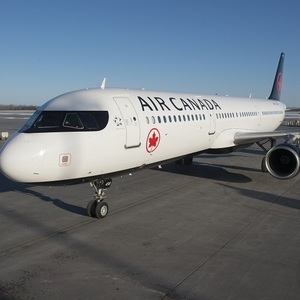Air Canada operates biofuel flight from Edmonton to San Francisco

Photo: Air Canada
May 3, 2018
BY Air Canada
Air Canada announced its Edmonton-San Francisco flight May 2 operated on biofuel in a 146-seat Airbus A320-200 aircraft. The larger aircraft was scheduled for the flight to accommodate the trade mission delegation led by the government of Alberta, the city of Edmonton and Edmonton-area businesses to California.
“Air Canada is proud to partner with the Edmonton International Airport to operate today’s flight with biofuel,” said Teresa Ehman, director of environmental affairs at Air Canada. “Air Canada continues to support and advocate for the development of biofuel in Canada to become commercially viable—a big step towards creating more sustainable aviation in Canada and internationally. This is our eighth biofuel-operated flight since 2012. The result of today’s biofuel use reduces this flight’s carbon emissions by over 10 tons, which represents a 20 percent reduction in net carbon emissions for this flight.”
Advertisement
Ehman said since 1990, Air Canada has improved its fuel efficiency by 43 percent. “We have also committed to meet ambitious targets set by the International Air Transport Association, including carbon-neutral growth from 2020 and to reduce CO2 emissions by 50 percent by 2050, relative to 2005 levels,” she said. “These efforts and other green initiatives to increase efficiency and reduce waste were recognized by Air Transport World, which, earlier this year, named Air Canada the Eco-Airline of the Year for 2018.”
Tom Ruth, president and CEO of Edmonton International Airport, said, “This biofuel demonstration flight reflects our combined commitment to bring forward low carbon, renewable fuels into the aviation and airport sectors. Air Canada’s leadership in the renewable resource sector strongly aligns with EIA’s commitment to regional economic development and sustainability, while reducing the long-term carbon impact of airport operations.”
“Dozens of Alberta businesses and organizations are joining us on today’s San Francisco flight, to help showcase our province’s potential abroad and create new jobs and opportunities at home,” said Deron Bilous, Alberta minister of economic development and trade. “Using biofuel is an important reminder that, by working with partners like Air Canada and EIA, Alberta will continue to be the energy and environmental leader North America needs for the 21st century.”
Advertisement
Don Iveson said, “This commitment and use of cleaner energy shows corporate leadership, which is integral to all of us working together to address climate change. I hope it encourages other companies to follow suit so we can continue to accelerate leadership on energy transition and climate change.”
Air Canada’s Edmonton-San Francisco daily, nonstop flights launched May 1.
Related Stories
Keolis Commuter Services, the Massachusetts Bay Transportation Authority’s operations and maintenance partner for the Commuter Rail, has launched an alternative fuel pilot utilizing renewable diesel for some locomotives.
Luxury North Dakota FBO, Overland Aviation—together with leading independent fuel supplier, Avfuel Corp.— on May 19 announced it accepted a 8,000-gallon delivery of sustainable aviation fuel (SAF) on May 12.
Neste and FedEx, the world’s largest express cargo airline, have agreed on the supply of 8,800 metric tons (more than 3 million gallons) of blended Neste MY Sustainable Aviation Fuel to FedEx at Los Angeles International Airport (LAX).
Wheels Up Experience Inc. on May 6 announced the launch of its new SAF program, under which Wheels Up will partner with Delta Air Lines to purchase SAF, allowing private fliers to participate regardless of their flight operator or departure airport.
Germany-based Mabanaft on April 17 announced it started to supply SAF to airlines at Frankfurt Airport in January. The company said it will deliver more than 1,000 metric tons of SAF to the airport this year under the European SAF mandate.
Upcoming Events










